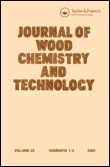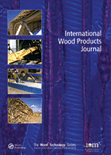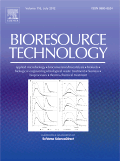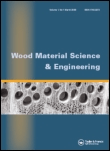
BioResources
Scope & Guideline
Connecting researchers to foster a sustainable future.
Introduction
Aims and Scopes
- Biomass Utilization and Conversion:
Research focuses on the conversion of various biomass materials into value-added products, including biofuels, bioplastics, and other biochemicals, utilizing sustainable methods. - Wood Science and Technology:
Studies on the physical, mechanical, and chemical properties of wood and wood-based products, including their processing, treatment, and performance under various conditions. - Nanotechnology Applications in Biomaterials:
Explores the use of nanomaterials and nanotechnology in enhancing the properties of bio-based materials, including their potential applications in packaging, coatings, and composites. - Environmental Impact and Sustainability:
Research addressing the environmental implications of biomass utilization and wood processing, including life cycle assessments, carbon footprint analysis, and sustainable forestry practices. - Innovative Processing Techniques:
Investigates novel methods for biomass processing, including advanced extraction techniques, biorefinery approaches, and the development of eco-friendly treatments for wood and biomass. - Bioproduct Development:
Focuses on the design and development of new bio-based products, including adhesives, coatings, and composites, derived from renewable resources.
Trending and Emerging
- Sustainable Biocomposites:
Research on biocomposites that utilize renewable materials and minimize environmental impact is gaining momentum, driven by the demand for eco-friendly alternatives in various industries. - Advanced Biomass Pretreatment Techniques:
Emerging studies focus on innovative pretreatment methods that enhance the efficiency of biomass conversion processes, making them more viable for commercial applications. - Machine Learning and AI in Biomaterials:
The integration of machine learning and artificial intelligence in predicting material properties and optimizing processes is becoming a prominent theme, showcasing the intersection of technology and biotechnology. - Circular Economy Approaches:
Research is increasingly addressing circular economy principles, focusing on waste reduction, resource recovery, and sustainable practices in the forestry and biomass sectors. - Lignin Valorization:
The exploration of lignin as a valuable byproduct in various applications, including adhesives, coatings, and biofuels, is trending significantly as industries seek to maximize resource efficiency. - Green Chemistry and Processing:
There is a growing emphasis on green chemistry principles in the development of bio-based materials, focusing on environmentally friendly processes that reduce chemical waste.
Declining or Waning
- Traditional Wood Processing Techniques:
Research on conventional methods of wood processing is becoming less prevalent as innovative technologies and more sustainable practices gain traction. - Single-Use Bioplastics:
As the emphasis shifts towards sustainable and reusable materials, research on single-use bioplastics is decreasing, reflecting a broader industry move away from disposable products. - Chemical Pulping Processes:
Interest in chemical pulping methods appears to be waning, likely due to a greater focus on mechanical and environmentally friendly alternatives that minimize chemical usage. - Non-renewable Resource Utilization:
There is a noticeable decline in studies focusing on the use of non-renewable resources in bioproduct development, as the sustainability agenda gains more attention.
Similar Journals

JOURNAL OF WOOD CHEMISTRY AND TECHNOLOGY
Bridging Theory and Practice in Wood ChemistryJournal of Wood Chemistry and Technology, published by Taylor & Francis Inc, is a premier academic platform dedicated to advancing the fields of wood chemistry and technology since its inception in 1981. With an impressive converged publication run extending through 2024, this journal addresses pivotal research in chemical engineering and materials science, achieving a current categorization in Q2 for both Chemical Engineering and Chemistry, alongside a Q3 ranking in Materials Science. As evidenced by its Scopus rankings, it occupies a respectable position within the academic community, fostering discussions that bridge theoretical innovation and practical applications relevant to the industry. While access is not open, the journal remains an essential resource for researchers, professionals, and students eager to explore the complexities of wood chemistry, enhancing their understanding and contributing to sustainable practices in materials development.

Bioresources and Bioprocessing
Empowering Research in Biomedical Engineering and BeyondBioresources and Bioprocessing is an esteemed open-access journal published by SPRINGER HEIDELBERG, dedicated to the innovative fields of biomedical engineering, biotechnology, food science, and renewable energy. Since its inception in 2014, the journal has rapidly established itself as a leading platform for high-quality research, boasting a Q2 ranking in key categories such as Biomedical Engineering and Biotechnology, and an impressive Q1 status in Food Science for 2023. With robust Scopus rankings placing it in the top percentiles across multiple disciplines, Bioresources and Bioprocessing serves not only as a conduit for original research but also for critical insights into sustainable bioprocessing techniques that contribute to environmental stewardship. It is particularly aimed at researchers, professionals, and students committed to advancing knowledge in the bioprocessing sphere, promoting evidence-based innovations that leverage biological resources for diverse applications. Emphasizing open access, the journal ensures that cutting-edge research is readily available to a global audience, reinforcing its commitment to scientific communication and collaboration.

Biomass Conversion and Biorefinery
Catalyzing research for a greener, sustainable future.Biomass Conversion and Biorefinery, published by Springer Heidelberg, is a prominent peer-reviewed journal dedicated to advancing the field of renewable energy and sustainable practices. With ISSN 2190-6815 and E-ISSN 2190-6823, this journal serves as a vital platform for researchers, professionals, and students focusing on the valorization of biomass and the development of biorefinery technologies. Notably, it holds a respectable impact factor and is categorized in the Q2 quartile of Renewable Energy, Sustainability and the Environment, indicating its strong influence within the academic community. Covering a wide range of topics from biomass feedstock characterization to innovative bioconversion processes, the journal aims to facilitate interdisciplinary collaboration and knowledge exchange. As it spans in scope from 2011 to 2024, audience members can benefit from timely research insights that contribute to sustainable energy solutions in a world increasingly focused on environmental stewardship.

WOOD RESEARCH
Connecting Scholars to Shape the Wood Science LandscapeWOOD RESEARCH is a premier academic journal published by the SLOVAK FOREST PRODUCTS RESEARCH INSTITUTE, dedicated to advancing knowledge in the fields of forestry and material science. With an ISSN of 1336-4561, this journal serves as a vital resource for researchers and professionals seeking to explore innovative research, advancements in wood technology, and sustainable practices related to forest products. Recognized for its quality, WOOD RESEARCH holds a Q2 ranking in the field of Forestry and a Q3 ranking in Materials Science according to the latest metrics, indicating a robust contribution to these disciplines. The journal is committed to open access options, ensuring that findings are accessible to a global audience, thereby fostering collaboration and knowledge sharing. Established in 2003 and operating through to 2024, it continues to play a significant role in shaping the future of wood research, offering insights that are essential for students, academics, and industry leaders alike. For detailed submissions and research discussions, the journal can be accessed through its dedicated platform, contributing to an enriched academic dialogue in Slovakia and beyond.

MOKUZAI GAKKAISHI
Pioneering Research in Wood Materials and ProcessingMOKUZAI GAKKAISHI, a prestigious journal published by the Japan Wood Research Society, serves as a critical resource for scholars and practitioners in the field of wood science and technology. With an ISSN of 0021-4795 and an E-ISSN of 1880-7577, this journal has been a pivotal platform since its inception in 1949, focusing on a broad spectrum of topics including wood materials, wood processing, and sustainable forestry practices. Although it does not currently offer open access options, its rigorous peer-review process ensures high-quality research dissemination. As researchers and professionals delve into the complexities of wood science, MOKUZAI GAKKAISHI stands out as an essential academic journal that informs, engages, and inspires innovative solutions in wood utilization and conservation efforts. The journal's historical significance and ongoing contributions make it a staple reference for anyone looking to advance their understanding of wood-related research and applications.

JOURNAL OF WOOD SCIENCE
Driving excellence in wood science research.The JOURNAL OF WOOD SCIENCE, published by SPRINGER JAPAN KK, stands at the forefront of research in the field of wood science and forestry. With an ISSN of 1435-0211 and an E-ISSN of 1611-4663, this journal has been a vital resource since its inception in 1998, continuing to contribute valuable insights through 2024. As an Open Access publication since 2019, it ensures that groundbreaking research is accessible to a wide audience, fostering knowledge dissemination in the disciplines of Biomaterials and Forestry, where it holds prestigious rankings in Q3 and Q1 categories, respectively. Furthermore, it is recognized within Scopus, ranking #26 out of 174 in Agricultural and Biological Sciences - Forestry and #66 out of 137 in Materials Science - Biomaterials, reflecting its significant impact and relevancy in academic circles. Based in Tokyo, Japan, the journal aims to promote high-quality research that drives innovation and sustainability in wood-related disciplines, making it an essential read for researchers, industry professionals, and students alike.

International Wood Products Journal
Connecting Researchers to the World of Wood ProductsInternational Wood Products Journal is a premier academic publication dedicated to advancing knowledge in the fields of forestry and materials science. Published by SAGE Publications Inc, this journal serves as a critical forum for researchers and professionals alike, focusing on innovative developments and sustainable practices related to wood and wood products. With an impressive impact factor that places it in the Q2 category for forestry and Q3 for materials science in 2023, it showcases high-quality research that influences policy and practice. Covering a wide scope from 2010 to 2024, the journal offers insightful articles and reviews that highlight the latest findings and technological advancements in wood products. Notably indexed in Scopus, it ranks 69th out of 174 in Forestry and 296th out of 463 in General Materials Science, attesting to its relevance and contribution to these fields. Researchers and students are encouraged to explore this journal for cutting-edge information and collaborative opportunities within the international wood products community.

BIORESOURCE TECHNOLOGY
Leading the Charge in Sustainable Resource UtilizationBioresource Technology, published by Elsevier Science Ltd, is a leading journal in the fields of bioengineering, environmental engineering, and sustainable resource management. With an impressive impact factor reflected in its Q1 rankings for 2023 across multiple relevant categories, it stands out as a premier source for groundbreaking research from its inception in 1991 to its anticipated contributions through 2024. Bioresource Technology promotes the advancement of technologies and methodologies aimed at the sustainable utilization of biological resources, playing a pivotal role in tackling the challenges of waste management, renewable energy, and environmental protection. Researchers and practitioners are encouraged to contribute and engage with high-quality studies that have significant implications for the global push towards sustainability and innovation. Although the journal does not currently offer Open Access, its subscription model ensures that the rigorous peer-reviewed content remains accessible to those dedicated to advancing the field.

Wood Material Science & Engineering
Advancing Sustainable Solutions in Material ScienceWood Material Science & Engineering, published by Taylor & Francis Ltd, is a pivotal journal in the field of materials science, focusing specifically on the intricate properties, performance, and applications of wood-based materials. With an ISSN of 1748-0272 and an E-ISSN of 1748-0280, this journal has established itself as a valuable resource for researchers and professionals working in the interdisciplinary domains of material science and engineering related to wood. Since its inception in 2006, the journal has seen continual growth, with its 2023 Scopus Rank placing it in the 49th percentile among general materials science journals. Although listed in Q3 of the materials science category, it plays a crucial role in facilitating innovative research and applications of wood materials, thereby significantly influencing sustainable practices in engineering and design. The journal invites original research articles, reviews, and case studies to further the understanding of wood materials, making it an ideal platform for scholars and practitioners dedicated to advancing material science. For researchers looking to disseminate their findings to a global audience, Wood Material Science & Engineering promises a dedicated avenue for impactful communication.

International Journal of Engineering Research in Africa
Fostering Knowledge, Driving ProgressThe International Journal of Engineering Research in Africa is a pivotal academic resource for researchers, professionals, and students interested in the multifaceted field of engineering within the African context. Published by TRANS TECH PUBLICATIONS LTD, this journal facilitates the dissemination of innovative research, covering a myriad of topics in engineering, from advanced materials to sustainable practices. With an ISSN of 1663-3571 and E-ISSN 1663-4144, this publication not only fosters scholarly communication but also contributes to the global engineering discourse, as evidenced by its current Q3 ranking in the Engineering (miscellaneous) category in 2023. Operating from its base in Switzerland, the journal has been actively publishing since 2010 and continues to play a vital role in the advancement of engineering knowledge, particularly in the African landscape. Although it does not offer an open access model, the journal's commitment to quality research ensures that it remains a valuable asset for those seeking to understand and innovate within the engineering sector. Its integration in Scopus with a rank of #175 out of 307 in General Engineering further underscores its relevance and impact in the engineering community.